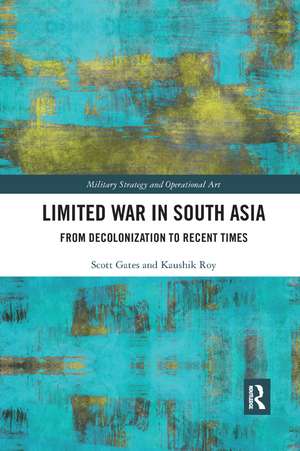Limited War in South Asia: From Decolonization to Recent Times: Military Strategy and Operational Art
Autor Scott Gates, Kaushik Royen Limba Engleză Paperback – 21 mai 2019
Although South Asia has experienced large-scale conventional warfare on several occasions since the end of World War II, there is an almost total neglect of analysis of conventional warfare in the Indian subcontinent. Focusing on China, India and Pakistan, this volume, therefore, takes a unique approach. Regional rivalries between India and Pakistan are linked with global rivalries between the US and USSR (later Russia) and then China, and war is defined in a broader perspective. The book analyses the conduct of land, sea and air warfare, as well as the causes and consequences of conflicts. Tactical conduct of warfare (the nature of mobile armoured strikes and static linear infantry combat supported by heavy artillery) and generalship are studied along with military strategy, doctrine and grand strategy (national security policy), which is an amalgam of diplomacy, military strategy and economic policy. While following a realpolitik approach, this book blends the development of military strategies and doctrines with the religious and cultural ethos of the subcontinent’s inhabitants. Drawing on sources not easily accessible to Western scholars, the overall argument put forward by this work is that conventional warfare has been limited in South Asia from the very beginning for reasons both cultural and realpolitik.
This book will be of much interest to students of South Asian politics, security studies, war and conflict studies, military studies and International Relations in general.
| Toate formatele și edițiile | Preț | Express |
|---|---|---|
| Paperback (1) | 416.22 lei 6-8 săpt. | |
| Taylor & Francis – 21 mai 2019 | 416.22 lei 6-8 săpt. | |
| Hardback (1) | 877.84 lei 6-8 săpt. | |
| Taylor & Francis – 21 noi 2017 | 877.84 lei 6-8 săpt. |
Din seria Military Strategy and Operational Art
-
 Preț: 469.34 lei
Preț: 469.34 lei -
 Preț: 449.41 lei
Preț: 449.41 lei -
 Preț: 397.71 lei
Preț: 397.71 lei - 18%
 Preț: 1011.33 lei
Preț: 1011.33 lei -
 Preț: 469.34 lei
Preț: 469.34 lei -
 Preț: 469.34 lei
Preț: 469.34 lei - 18%
 Preț: 1060.25 lei
Preț: 1060.25 lei - 18%
 Preț: 1058.23 lei
Preț: 1058.23 lei - 18%
 Preț: 1059.45 lei
Preț: 1059.45 lei -
 Preț: 420.30 lei
Preț: 420.30 lei - 30%
 Preț: 768.36 lei
Preț: 768.36 lei -
 Preț: 392.54 lei
Preț: 392.54 lei - 17%
 Preț: 257.49 lei
Preț: 257.49 lei - 18%
 Preț: 1109.99 lei
Preț: 1109.99 lei - 28%
 Preț: 848.15 lei
Preț: 848.15 lei - 19%
 Preț: 259.54 lei
Preț: 259.54 lei - 18%
 Preț: 844.66 lei
Preț: 844.66 lei -
 Preț: 397.93 lei
Preț: 397.93 lei - 30%
 Preț: 771.32 lei
Preț: 771.32 lei
Preț: 416.22 lei
Nou
Puncte Express: 624
Preț estimativ în valută:
79.65€ • 86.49$ • 66.91£
79.65€ • 86.49$ • 66.91£
Carte tipărită la comandă
Livrare economică 22 aprilie-06 mai
Preluare comenzi: 021 569.72.76
Specificații
ISBN-13: 9780367338787
ISBN-10: 0367338785
Pagini: 228
Ilustrații: 12
Dimensiuni: 156 x 234 x 20 mm
Greutate: 0.45 kg
Ediția:1
Editura: Taylor & Francis
Colecția Routledge
Seria Military Strategy and Operational Art
Locul publicării:Oxford, United Kingdom
ISBN-10: 0367338785
Pagini: 228
Ilustrații: 12
Dimensiuni: 156 x 234 x 20 mm
Greutate: 0.45 kg
Ediția:1
Editura: Taylor & Francis
Colecția Routledge
Seria Military Strategy and Operational Art
Locul publicării:Oxford, United Kingdom
Public țintă
Professional and UndergraduateCuprins
Introduction 1. Origins of the Indian and Pakistan Armed Forces 2. The First India-Pakistan War 3. The China-India War 4. The Second India-Pakistan War 5. The Bangladesh War 6. The Kargil War 7. Planning for Future War Conclusion
Notă biografică
Scott Gates is Professor of Political Science at the University of Oslo, Norway and Director Centre for the Study of Civil War, Peace Research Institute Olso (PRIO), Norway.
Kaushik Roy is Guru Nanak Chair Professor at the Department of History, Jadavpur University, Kolkata, India and Global Fellow at Peace Research Institute Oslo (PRIO), Norway.
Kaushik Roy is Guru Nanak Chair Professor at the Department of History, Jadavpur University, Kolkata, India and Global Fellow at Peace Research Institute Oslo (PRIO), Norway.
Descriere
Based on sources not easily accessible to Western scholars, this volume argues that conventional warfare has been limited in South Asia from the very beginning, for reasons both cultural and realpolitik.
